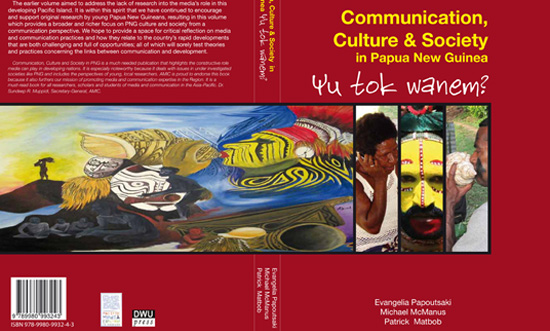
REVIEW: Communication, Culture and Society in Papua New Guinea: Yu tok wanem? edited by Evangelia Papoutsaki, Michael McManus and Patrick Matbob. Madang, PNG: Divine Word Press; Auckland: Pacific Media Centre. Published: March 9.
Reviewer: Nancy Sullivan
Nothing could be more important to social and economic development in Papua New Guinea than communication. And nothing could be more important to the understanding of communication in PNG than Yu tok wanem?
This is the second volume in Divine Word University’s Media and Communications series, edited by a trilogy of esteemed educators. It is a welcome contribution to the literature and covers a range of topics, from the reportage of social issues, including gender violence and the HIV/AIDs epidemic, to the balance and quality of both development awareness programmes and the print media reporting on development project.
The contributors include former UPNG journalism head Professor David Robie, with research on print media newsrooms in PNG and Fiji; top journalist Patrick Matbob, writing about the changes in PNG media; University of Goroka’s Komuniti Tok Piksa Project coordinator, Verena Thomas, on video research tools; and ex-DWU lecturer Amanda Watson, on her mobile phone research from Karkar island.
The book’s four sections are Mainstream media issues, Social issues, Information and development issues, and Searching for solutions.
It’s a diverse and ungainly collection, but each chapter is well presented and reflects the emphasis on research that DWU has taken in the last few years.
In a country of more than 800 languages, where pluralism of thought and behavior is vitally important, we can see in this volume some of the inherent tensions of journalism (such as the notion that information should be democratically distributed), and the demand to give voice to all sides of an issue (when there is no single "common man" perspective).
There is an interesting chapter on the coverage of landowner views from the Ramu Nickel Project, and another on OTML’s media efforts.
Digital media missing
What’s surprisingly lacking in this volume, and may reflect the crucial time to publication difference between print and digital media, is research on the new social media in PNG.
It is already assumed that the internet and blogosphere have changed not just the political climate, with the explosion of citizen activism, but also the very nature of information authority and distribution in PNG, so readers may yearn for an epilogue on the subject.
This volume is dedicated to strengthening the integrity and applicability of media research in a developing country, and in many ways the social media is a direct affront to those efforts.
Some of the questions that lurk beneath these chapters have to do with the frisson between a positivist Western research model and the nature of malleable ‘truths’ for indigenous Melanesian communication.
The new social media may be free speech run amuk, or a weird chimera of the indigenous model, but it is not the grasruts revolution some would make of it.
New media have stormed the ivory tower but still remain the tools of an urban elite. Can they be subject to the kind of quality control that is implicit to academic communications study?
The range of media in PNG and its differential access raises thorny issues education curricula and service delivery in the future. What will be the future of PNG news reportage? How will we rely on it?
One of the curious "fits and starts" of development in this country has been our media leapfrogging, and how, as a country, we knew the fax machine before the telex, the Digicel mobile phone before access to national newspapers.
Indeed, we may soon find remote villagers chatting on Facebook before they’ve ever seen a book.
And will we be teaching SMS speak as a new Pidgin?
I recommend this book to anyone interested in this vivid and exciting field of media and communication in PNG, and look forward to reading excerpts from it online.
Nancy Sullivan is a communicator and media consultant based in Madang, Papua New Guinea.



